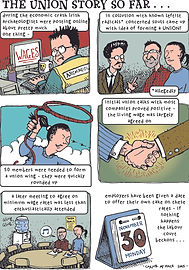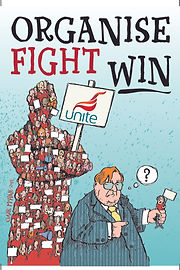Union Action In The Past
For ten years, we have advised, represented and negotiated on behalf of our members, improving quality of life for archaeologists across the country.

Click image to enlarge

Archaeologists making a public demonstration for a living wage for archaeologists, outside of Dáil Éireann in 2015.

Digging4decency achieved a wage increase from €8.75p/hr, to €11.45p/hr - a 30.8% increase to their wages - from €350 per week to €458 per week overnight.

Archaeologists making a public demonstration for a living wage for archaeologists, outside of Dáil Éireann in 2015.

Click image to enlarge
Digging for a living wage
In mid-2008 there were over 800 archaeologists working in Irish Archaeology, by mid-2009 there were less than 80. The rippling effects of the 2008 financial crisis caused a 90% unemployment rate for archaeologists, and shows how quickly we can go from boom to bust. We lost a huge number of experienced and skilled archaeologists, most of whom retrained in order to weather the financial crisis, and never returned to the industry. By 2014, wages remained low. Site Assistants were paid as low as €8.75 per hour, Supervisors as low as €11, and Site Directors as low as €13.75. During this period, the Unite – Archaeology (ROI) Branch was initially set up. For two years, just two people, Jean O’Dowd and the late Dr. Eileen Reilly. tirelessly recruited members to the budding union, and by 2014, they had accrued the 50 members necessary for official recognition as a union. A year after the official recognition of Unite Archaeology, membership had risen by 60% (to 80 members), and in April 2015, members voted to begin our first campaign – Digging for a Living Wage - aimed at lifting archaeologists out of poverty, through a commitment to refuse to work for any less than the living wage (€11.45p/hr in 2015). Most companies supported the unions efforts, and together, we successfully raised the base rate of pay from €8.75 to €11.45p/hr. Overnight, commercial archaeologists received a 30.8% increase to their wages - from €350 per week to €458 per week overnight. In October 2015 we wrote to all Irish archaeological consultancies with a pay claim of €11.50 for trainees, €15.85 for Assistants, €19 for Supervisors and €26.85 for Site Directors. At the time, only two employers were paying these rates or higher; with most employers offering €13.50-€14.00p/hr for assistants. The pay claim was successful in raising many employers’ rates, and we set about drafting our SEO application for the sector.
Strike Action
In January of 2017, Unite Archaeology Ireland issued a further pay claim to Irish archaeological employers. This pay claim requested €14.30 for Site Assistants, €17.60 for Supervisors, and €22.00 for Directors. Many good employers wrote back to say they were paying higher than those rates (Archaeology Plan, Archaeological Projects, ABH, Redarc, Moore Group, Aegis, Dominic Delaney, Kilkenny Archaeology and a few others). ACSU wrote back and said they were paying those rates (they weren’t), but they soon increased their pay to reflect the pay claim. However, neither Rubicon, or IAC responded to the pay claim, At that time, they refused to engage with the union. Because Rubicon and IAC weren’t paying rates above those outlined in the pay claim, we balloted our members in both Rubicon and IAC, for strike action. Members in both companies voted unanimously in favour of the strike. Thankfully, a week before the strike, Rubicon agreed to sit down with the union in the Labour Court, where we negotiated a secure agreement for better wages for Rubicon employees - with immediate effect. The agreement included: back-dated increases, and percentage increases to wages, to be paid over the following three years. This agreement meant that, if a recession hit the country, employers couldn’t legally drop those rates. This was an essential policy in securing the future of our industry - dissallowing lower-paying companies, from dropping their pay rates, and undercutting other, well-paying companies, in order to corner the market; as is what happened in 2009. Unfortunatly, IAC refused to even talk to us, leading to the 1st strike in the history of Irish Commercial Archaeology - happening in Macroom, 4th July 2018. IAC still refused to talk, or change their rates, so a second strike occurred on their Aungier Street site on 19th July 2018. By August, IAC joined us at the negotiating table, whereupon we were able to secure rates in-line with those in the pay claim. This affected new employees, and new sites, from that time onwards. In an attempt to skirt these agreements, IAC established a policy of separating site assistants into 3 levels, based on experience and career progression. This allowed IAC to rationalise the paying less-experienced staff, less money - as little as €520p/w (€13.80p/hr). The pay-rise and grading system that IAC agreed & implimented, benefitted and placated many of our experienced union members, but not so much for lesser experienced archaeologists. The agreements that Unite Archaeology Ireland reached with IAC, only applied to new employees and new sites, meaning that union members working on the IAC site in Portmarnock, were receiving lower rates than everyone else working for IAC. This was the reason for our 3rd strike - on the IAC site in Portmarnock in November 2019, but the site was due to soon finish up, so our members lost their leverage for better pay. In January of 2020 IAC failed to attend a Labour Court hearing regarding their refusal to recognise their employee's right to representation by their union of choice. IAC is (at time of writing), still held in contempt by the Labour Court.
First Sectoral Employment Order Application
In July 2016, Unite Archaeology attended the Labour Court in an attempt to have a Sectoral Employment Order established for commercial archaeologists. This would have fixed those pay claim rates, as the minimum rates-of-pay for Assistants, Supervisors and Directors. The application was opposed by ACSU, IAC, TVAS and Rubicon, who gathered together to fight against it, claiming that the 140 members of Unite Archaeology, was not a sufficient representative number of archaeologists working in the commercial archaeology sector. Unfortunately, for this reason, the application was rejected. Click here to read all the submissions in this case. This is why every member counts!

Click image to enlarge

Unite Archaeology Ireland member's first ever strike action.



Unite Archaeology Ireland member's first ever strike action.

Click image to enlarge





